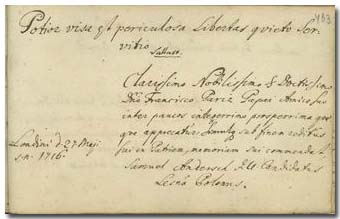
Potior visa est periculosa libertas quieto servitio. Sallust. *
Clarissimo Nobilissimo & Doctissimo D[omi]no Francisco Pariz Papai
Amico suo inter paucos integerrimo prosperrima quaeque apprecatur,
simulque sub finem reditûs sui in Patriam, memoriam sui commendat,
Samuel Andersch I[uris] U[triusque] Candidatus Lesnâ Polonus.
Londini d. 27. maji s[tilo] n[ovo] 1716.
|
* Sallustius, Fragmenta, ed. Lep.
l. 105.
|
|
|
|
Imperiled liberty is more desirable than peaceful servitude.
Sallustius. *
I wish all kind of success to the
illustrious, noble and learned Mr. Ferenc Pápai Páriz, and finally
fortunate return to his fatherland; and I recommend myself to his
benevolent memory
The Polish Samuel Andersch
of Lesna,
candidate of both laws
In London, on May 27, 1716 by the
new calendar
|
p.
463. London, May 27, 1716
Andersch, Samuel
(c. 1688-?), Polish student of law
Samuel Andersch was born around 1688, and immatriculated at the
faculty of law at Leiden on March 4, 1715, at the age of 27, as
"Samuel Anders, Polonus, 27, Juris studiosus". He probably had
also read theology. As a delegate of the Polish town of Leszno
(Lissa), he went with the pastor Krystian Sitkowski to England to
collect donations for the Protestant church and school. In this
mission they enjoyed the support of the Berlin court pastor Daniel
Ernst Jablonski, a former student in Leszno and later pastor in
the same town. The notes and accounts made by Andersch during his
fundraising tour are preserved in the British Library.
Ferenc Pápai Páriz, in a letter sent to Count Sándor Teleki from
London on December 25, 1715 (by the old calendar in use there on
December 14) related that “Polish suppliants [that is, collectors
of donations] who in the Netherlands had come before us and had
made a good profit”, arrived six weeks ago to England with letters
of recommendation of the Prussian King (Frederick William I,
1713-1740). Pápai Páriz does not mention names, but the
“suppliants” are most probably identical with those two persons
who made their notes in two facing pages of his album in May 1716
(Andersch) and October 1717 (Sitkowski), respectively (pp.
463,
462). Andersch defines himself as “J. U.
Candidatus”, probably on the model of the grade of “J[uris]
U[triusque] Doctor” (doctor of both laws, that is of Roman and
Canon law). It is noteworthy that the circular issued by King
George I (1714-1727) on March 23, 1716 for the promotion of the
collection of donations for the College of Nagyenyed (Aiud), has
also survived in a copy by Samuel Andersch [Gömöri: Adalékok]. –
The elder Jablonski had written in the album at the beginning of
the voyage of Pápai Páriz, on November 16, 1711 in Berlin (p.
121).
•
AlbLeid 840 • Jankovics 143, 150 • Peregrinus 64 |

